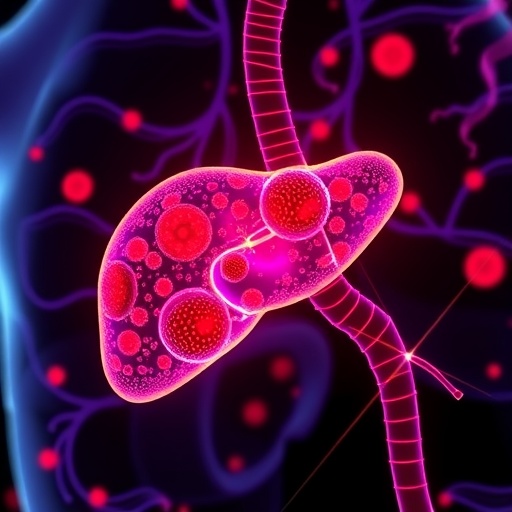In a groundbreaking study poised to reshape therapeutic strategies for hepatocellular carcinoma (HCC), researchers have demonstrated the superior efficacy and safety of combining tyrosine kinase inhibitors (TKIs) and programmed cell death protein-1 (PD-1) inhibitors with hepatic arterial infusion chemotherapy (HAIC) or transarterial chemoembolization (TACE) in managing recurrent unresectable HCC. This advancement offers renewed hope for patients facing limited options after surgical recurrence, marking a potential paradigm shift in oncological intervention for liver cancer.
Hepatocellular carcinoma remains one of the most prevalent malignancies worldwide and carries a notoriously high recurrence rate following surgical resection. Such recurrences often present as unresectable lesions, demanding alternative therapeutic approaches. Despite advances in loco-regional therapies, no standardized treatment regimen currently exists for managing recurrent unresectable HCC, highlighting an urgent unmet clinical need.
The study, published in BMC Cancer, retrospectively analyzed clinical data from 83 patients diagnosed with recurrent unresectable HCC after initial surgery. The patients were stratified into three distinct treatment cohorts based on their regimens: a group receiving HAIC combined with TKIs and PD-1 inhibitors (HTP), a second group treated with TACE in combination with TKIs and PD-1 inhibitors (TTP), and a third control group undergoing TACE alone. This design enabled a robust comparative assessment of treatment efficacy and safety among cutting-edge combination therapies versus standard intervention.
HAIC and TACE are both hepatic artery-targeted therapies aimed at delivering chemotherapeutic agents directly to liver tumors, thereby maximizing local antitumor activity while limiting systemic toxicity. Combining these modalities with TKIs, which inhibit angiogenesis and tumor proliferation pathways, alongside PD-1 inhibitors that unleash anti-tumor immune responses, represents an innovative multimodal approach to tackle tumor progression on multiple fronts simultaneously.
The primary endpoint assessed was progression-free survival (PFS), a critical measure reflecting the duration during which patients remained free from disease advancement. Results revealed a marked improvement in median PFS among patients receiving combination therapy. Specifically, the HTP group demonstrated a median PFS of 13.7 months, substantially longer than the 9.2 months observed in the TTP group and dramatically exceeding the 2.5 months recorded for those treated with TACE alone. These findings underscore the additive benefit of incorporating both TKIs and PD-1 inhibitors alongside hepatic arterial infusion strategies.
Remarkably, the incidence of complete response was restricted to the HTP group, with 17.2% of patients achieving this outcome. This contrasts starkly with a complete response rate of zero in both the TTP and TACE alone arms. Such results suggest that HAIC, when synergized with TKIs and PD-1 checkpoint blockade, may elicit profound antitumor effects potentially capable of eradicating clinically evident disease in a subset of patients.
Safety profiles across treatment arms were carefully monitored, revealing no occurrences of serious adverse reactions within the HTP and TTP groups. This highlights the tolerability of these combination regimens, which is pivotal considering the typically compromised hepatic reserve and overall frailty of advanced HCC patients. The absence of severe toxicity supports the feasibility of integrating immunotherapy and targeted agents with locoregional chemotherapy in clinical practice.
Mechanistically, the therapeutic synergy observed likely stems from complementary modes of action. TKIs suppress tumor angiogenesis and cellular proliferation, thereby restricting nutrient supply and direct tumor growth. PD-1 inhibitors enhance the host immune system’s capacity to recognize and destroy cancer cells by preventing immune checkpoint-mediated T cell exhaustion. Concurrently, HAIC and TACE deliver localized cytotoxic chemotherapy that induces tumor necrosis. This concerted attack disrupts the tumor microenvironment, potentially overcoming resistance mechanisms seen with monotherapy.
This study’s implications extend far beyond survival statistics. It emphasizes the evolving landscape of HCC treatment, where integrating systemic immunomodulation and targeted therapy with traditional intra-arterial chemotherapy heralds a new era of personalized oncology. Identifying patients most likely to benefit from such regimens remains an ongoing challenge, necessitating further biomarker-driven investigations.
Despite its retrospective design and relatively modest sample size, the research offers compelling evidence warranting prospective, randomized clinical trials to validate these findings. The ability to induce complete responses in previously refractory recurrent HCC patients could translate into durable remissions and improved overall survival, transforming standard care paradigms.
In summary, the combination of TKIs and PD-1 inhibitors with HAIC or TACE demonstrates superior efficacy and safety compared to TACE alone in treating recurrent unresectable hepatocellular carcinoma. Particularly, HAIC combined with these systemic agents achieves the highest complete response rates, shedding light on promising therapeutic avenues. As liver cancer continues to pose formidable clinical challenges, these findings pave the way toward more effective, multimodal treatment strategies that improve patient outcomes and quality of life.
Future research should aim to elucidate the molecular underpinnings driving response heterogeneity and resistance, optimize dosing schedules, and evaluate long-term survivorship benefits. Moreover, integrating advanced imaging modalities and liquid biopsy approaches may facilitate early detection of treatment response and recurrence, further refining clinical decision-making. Ultimately, multidisciplinary collaboration will be key to translating these scientific insights into routine clinical application.
The study stands as a testament to the rapidly advancing frontier of oncological therapeutics, underscoring the power of combining precision medicine, immunotherapy, and locoregional interventions. As these innovations converge, they offer renewed optimism for patients confronting the formidable challenge of recurrent unresectable hepatocellular carcinoma.
Subject of Research: Treatment efficacy and safety of tyrosine kinase inhibitors and programmed cell death protein-1 inhibitors combined with hepatic arterial infusion chemotherapy/transarterial chemoembolization for recurrent unresectable hepatocellular carcinoma.
Article Title: The safety and efficacy of tyrosine kinase inhibitors and programmed cell death protein-1 inhibitors combined with HAIC/TACE in the treatment of recurrent unresectable hepatocellular carcinoma.
Article References:
Deng, W., Xie, J., Wang, T. et al. The safety and efficacy of tyrosine kinase inhibitors and programmed cell death protein- 1 inhibitors combined with HAIC/TACE in the treatment of recurrent unresectable hepatocellular carcinoma. BMC Cancer 25, 779 (2025). https://doi.org/10.1186/s12885-025-14185-x
Image Credits: Scienmag.com
DOI: https://doi.org/10.1186/s12885-025-14185-x
Tags: clinical study on liver cancercombination therapy for liver cancerhepatic arterial infusion chemotherapyhepatocellular carcinoma therapyinnovative cancer therapiesliver cancer treatmentoncological intervention strategiespatient treatment outcomesPD-1 inhibitorsrecurrent unresectable HCCtransarterial chemoembolizationTyrosine kinase inhibitors





